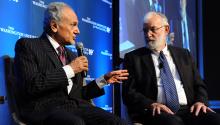By Daniel Serwer
Hezbollah is the right target of U.S. in Syria
The military situation
in Syria has turned against the U.S.-supported opposition over the past year,
due mainly to Russian intervention. Now, the failed coup in Turkey and subsequent
crackdown there stand to reduce the capabilities of a key U.S. ally. Without
some rebalancing now in favor of the opposition to Syrian dictator Bashar
al-Assad, the prospects for a satisfactory negotiated political transition are
dim.
In a dissenting internal memo last month, 51 State
Department diplomats advocated attacks on Syrian government forces to end
their aggression against the country’s civilian population, alter the military
balance and bring about a negotiated political solution. President Obama has
focused instead on fighting terrorism in Syria, but U.S. targets are limited to
Sunni extremists such as the Islamic State and al-Qaeda affiliates.
There is also a Shiite terrorist organization in
Syria: Lebanon-based Hezbollah. It should not be immune.
Hezbollah was founded to resist the Israeli
occupation of Lebanon in the early 1980s and takes credit for the eventual
Israeli withdrawal from that country. Tightly allied with and supported by
Iran, it has become the dominant political force among Shiites in Lebanon,
where it not only participates in national politics but also runs its own
security forces and provides social services to Shiite populations.
Covertly since 2012, and overtly since 2013,
Hezbollah has deployed forces inside Syria, where its thousands of fighters are
aligned with Assad’s army and mainly Shiite and Alawite militias against mainly
Sunni forces that Assad regards as terrorists. The Iranian Revolutionary Guard
Corps pays Hezbollah’s bills and provides its command-and-control operations.
Hezbollah forces have been particularly effective along the border with
Lebanon, which provides it with strategic depth and supply lines.
Hezbollah is a major
factor in the military balance in Syria. Along with the Russian air intervention begun last September and the Iranian
Revolutionary Guard, Hezbollah’s fighters have enabled Assad to make progress
against his opponents, especially those associated with the Free Syrian Army
fighters backed by the United States. That progress has hardened Assad’s
negotiating stance and blocked the U.N. search for a political solution. Assad
is winning, and he sees no reason to accept a transition away from his rule.
A shift in the military balance is essential to
ending the war, which is what Washington says it wants. But Obama has
steadfastly refused to go to war against the Syrian, Iranian or Russian
government. Even if he wants to, it is doubtful he has authorization from
Congress to do so.
But Hezbollah is a
non-state actor. It is also a U.S.-designated terrorist group that has murdered
Americans, among many others. Most Republicans and Democrats would applaud an
attack on Hezbollah, even if some in both parties would bemoan a move that
suggested widening commitments overseas.
Washington could
inform Tehran, Moscow and Beirut that Hezbollah should withdraw from Syria by a
certain date or the United States would target any of its troops attacking
non-extremist opposition forces in and around Aleppo and elsewhere. If
Hezbollah failed to withdraw, the United States would then need to be ready to
attack as soon as the ultimatum expired.
Hezbollah’s withdrawal
or U.S. targeting of Hezbollah would send a strong but still limited message to
the Syrian opposition and its allies in Turkey and the Persian Gulf: We are
prepared to attack Shiite as well as Sunni terrorists, but it’s up to you to
take advantage of the opportunity and come to the negotiating table ready to
reach a serious political settlement. It would also send a strong but likewise
limited message to Iran and Russia: We will not continue to tolerate your
intervention in Syria without responding. The time for a political settlement
is now.
How would the players
in Syria react? Hezbollah would likely try to strike at accessible U.S. assets
or citizens in neighboring countries, most likely in Lebanon or Iraq. It might
also launch rockets into Israel. The Islamic State, which uses Hezbollah’s
involvement in Syria as a recruiting tool, would be undermined. Russia and Iran
could in theory up the ante, escalating their involvement in Syria, but in
practice they both appear to be close to the limit of lives and treasure they
are willing or able to expend there. Assad would be outraged and promise
revenge, but the Syrian government is even more clearly at the limit of its
capabilities.
Meanwhile, the
non-extremist Syrian opposition would applaud and press hard against the
territory where Hezbollah is deployed. Gulf states would likewise welcome the
U.S. action and redouble their efforts to support the opposition. Israel knows
all too well how to react to Hezbollah attacks in order to re-establish
deterrence. Turkey might complain that the United States was not also acting
against the U.S.-allied Kurdish fighters whom Ankara regards as terrorists, but
the Turks would still benefit from any consequent military progress against
Assad by non-Kurdish forces.
In short, U.S.
targeting of Hezbollah would mostly please and embolden Washington’s friends
and discomfit its antagonists. It would also reassert U.S. commitment to
fighting terrorism of all sorts, renew Washington’s commitment to holding
Hezbollah accountable, hasten an end to the Syrian civil war and make a
political settlement more likely. That is not a bad balance of risks and
benefits.
* The writer is a
professor and director of the conflict management program at the Johns Hopkins
School of Advanced International Studies, as well as a scholar at the Middle East
Institute.
* This opinion was published first by Washington Post on 27/07/2016


